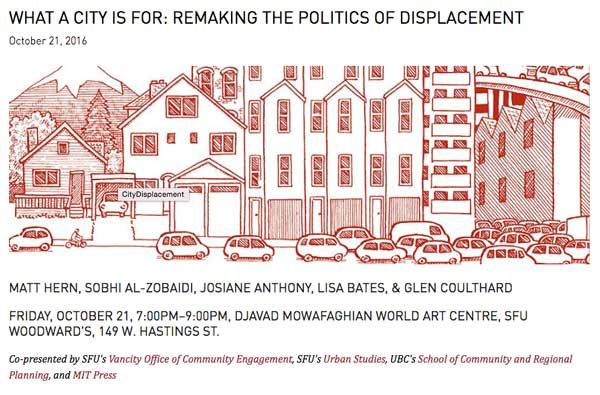WHAT A CITY IS FOR: REMAKING THE POLITICS OF DISPLACEMENT Book Launch
Date: FRIDAY, OCTOBER 21,
Time: 7:00PM–9:00PM,
Location: DJAVAD MOWAFAGHIAN WORLD ART CENTRE, SFU WOODWARD’S, 149 W. HASTINGS ST.
Admission: This event is FREE and open to the public. Registration is required.
Portland, Oregon, is one of the most beautiful, livable cities in the United States. It has walkable neighbourhoods, bike lanes, low-density housing, public transportation, and significant green space—not to mention craft-beer bars and locavore food trucks. But liberal Portland is also the whitest city in the country. This is not circumstance; the city has a long history of officially sanctioned racialized displacement that continues today.
Over the last two and half decades, Albina—the one major Black neighbourhood in Portland—has been systematically uprooted by market-driven gentrification and city-renewal policies. African Americans in Portland were first pushed into Albina and then contained there through exclusionary zoning, predatory lending, and racist real estate practices. Since the 1990s, they’ve been aggressively displaced—by rising housing costs, developers eager to get rid of low-income residents, and overt city policies of gentrification.
Displacement and dispossessions are convulsing cities across the globe, becoming the dominant urban narratives of our time. In What a City Is For, Matt Hern uses the case of Albina, as well as similar instances in New Orleans and Vancouver, to investigate gentrification in the twenty-first century. In an engaging narrative, effortlessly mixing anecdote and theory, Hern questions the notions of development, private property, and ownership. Arguing that home ownership drives inequality, he wants us to disown ownership.
How can we reimagine the city as a post-ownership, post-sovereign space?
Drawing on solidarity economics, cooperative movements, community land trusts, indigenous conceptions of alternative sovereignty, the global commons movement, and much else, Hern suggests repudiating development in favour of an incrementalist, non-market-driven unfolding of the city.
This event is co-presented by SFU’s Vancity Office of Community Engagement, SFU’s Urban Studies, UBC’s School of Community and Regional Planning, and MIT Press.
***
For more information on What a City is For: Remaking the Politics of Displacement visit the MIT Press website.




